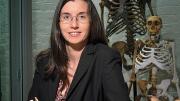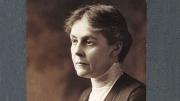“Teeth have rhythms inside them that are very precise, regular, and consistent, like rings in tree trunks,” says Tanya Smith, associate professor of human evolutionary biology. “And like tree rings, they can show you how long the organism has been growing—but on an even finer scale. Children’s teeth lay down a mineralized record of growth every day. Your entire childhood is recorded in your teeth.” The same holds for other primates. Thus Smith, using light microscopy, once examined a tooth section from a wild chimpanzee that died of Ebola in the early 1990s. After locating the “birth line,” the birth process inscribed in teeth, she determined the chimp had lived 1,396 days; field notes showed she was off by only 24 days. Smith learned microscopy at SUNY Geneseo as a biology concentrator who also studied biological anthropology, earning her B.S. in 1997; her Ph.D. in anthropological sciences came in 2004 from SUNY Stony Brook. She then spent several years at the Max Planck Institute for Evolutionary Anthropology in Leipzig, arriving at Harvard in 2008. The ability to attribute precise ages to juveniles, even those from the early Pleistocene, can shed light, she says, on evolutionary riddles like the origin of the very long childhood, relatively late age at reproduction, and lengthy lifespan of human beings. Primates that grow and erupt teeth earlier also reproduce sooner and live shorter lives. “Earlier hominins like Neanderthals seem to have had faster dental development,” she notes, “implying more accelerated overall growth and development than our species.” Away from the lab, Smith is an avid kayaker who enjoys field research like studying apes, monkeys, and lemurs in their natural habitats: “I love being out in the wild.”
Harvard Portrait: Tanya Smith

You might also like
Taking the Fight for Equality into the AI Era
Radcliffe Institute conference tackles bias, fairness, inclusivity in AI development.
Research on Hold
Funding freeze halts Harvard projects overnight.
Ben Franklin’s Project
Historian Joyce E. Chaplin reinterprets an early era of invention, industrialization, and climate challenge
Most popular
Explore More From Current Issue
Alice Hamilton at Harvard—Pioneer for Women in Medicine
Brief life of a public-health pioneer and reformer: 1869-1970
Biology's "Mirror Organisms"—And Their Dangers
Life forms built from left-handed DNA and RNA could threaten Earth’s plants, animals, and insects.








